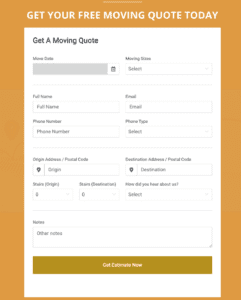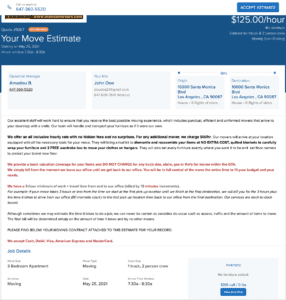How much will your move cost?
Finding out how much the whole ordeal of moving will cost you is understandably the most complicated aspect to get right. You want to make sure your move is done in a timely and efficient manner without breaking the bank. Knowing Moving services can be quite costly it is important to ensure you are receiving a good service at a reasonable price. So how can you find out exactly how much it will cost to move your 1, 2 or 4 bedrooms house or apartment content into your new home?
After several years in the moving business one thing we have learned is that every move is very situational. With most moving companies billing an hourly rate It is common practice to overlook the multiple factors that can affect how long a move takes. Like in all service business realize that you get what you pay for. Extremely cheap moving services may seem very attractive on paper but are almost always bad services from unprepared, under-equipped and inexperienced movers resulting in damaged items and hidden fees. When it comes to moving all your valuables making sure you receive a safe and quality service does come at a cost. Most moving companies will provide an hourly rate and they can vary anywhere from $90 to $200 for 2 movers and a truck depending on the seasons and period of the month. Since comparing them based on the price only is clearly not a good practice you have to make sure to consider the quality and services offered with that price and how it fits your particular needs.
Every moving process begins with a request of a quote/estimate from multiple companies. This is the most important part as this is the moment you have the power to decide which company does not fit your requirements or which company is too expensive or even which company as the best to offer. In a previous blog we talked about how to quickly swift through moving estimates so if you need help on that front check it out here.
With most companies offering an hourly rate billing finding out how much your move cost is as simple as finding out how much any moving company you choose charges for the day you are looking to move. A simple google search will quickly allow you to find out that in general it takes 2 movers 4-6 h to move a 1 bedroom content ; 6-8 h for a 2 bedroom content; 8-10h for a 3 bedroom content; 10-12h for larger homes.
Our Accurate Moving cost calculator to avoid surprises
Satisfied? well we are not so sure. As we have mentioned earlier moving is very situational and this general google calculation might be satisfying if that is what you are looking for but it is clearly not specific to your needs and does not take into account crucial factors that can result in a huge difference with the estimate you receive and the actual amount you pay at the end of the move.
After many years trying different methods to find out closely how much your move will cost not just to save you from the surprise of a higher bill then estimated but also for our movers and moving consultant to be able to provide seamless service and accurate information during the booking process to everyone, we started providing Smart interactive system-based Estimates to all based on a accurate inventory of all the items being moved while taking into account all driving distances and handicap time that may arise from elevators or walking distance from unit to truck parking, or amount of stairs.
This application allowed us to provide a personalized estimate portal where every customer can review all their moving information clearly. Each customer can submit an accurate room-based inventory of all the items being moved. The system takes into account all the handicaps in terms of building situation such as Number of flight of stairs, Elevator in use, Parking distance to front door, nature of the location (house, apartment, town house). After all these information being submitted, an automatic and accurate custom time estimate is generated alongside the amount of truck space and number of movers to complete it in one trip. Your dedicated moving consultant will provide those numbers to you directly on your custom portal so that you can make the best decision when it comes to confirming and choosing your movers. Our success rate using this method so far in terms of accuracy of the estimate compared to final bill is around 92% and we are getting better by the day as our movers work to go above and beyond your expectation on each move.
To put our system to the test and Find out your accurate moving cost here are the steps to follow:
1. Fill out the quote form Accurately and have a quick conversation with a moving consultant to confirm the moving details

2. View the estimate andFill up the room based inventory or have your moving consultant help you fill it out accurately.




3. Expect the moving consultant to provide you with a clear and accurate estimate with dollar amounts to back it up.
4. Accept the estimate Pay the deposit to book your move.

5. Sit back and let us take care of your move..


It’s interesting to know that most companies would be on an hourly rate basis, but it would be a good idea to check the various factors that would affect it as well. I think that would definitely be important for business moving since the project would be bigger. There would be various pieces of equipment and materials to be transported, so having an idea on the basis of the cost would help the owners budget their finances well.
Hi Mia. That is a great point and that is exactly what we provide when you request a quote from us. Our system allows every customer to receive an accurate moving quote based on a detailed inventory list of the items being moved, the number of stairs or elevators, the length of the walk from the unit to the elevator for apartments and the distance to the truck parking spot as those variables affect the time and man power required and ultimately the cost of the move.